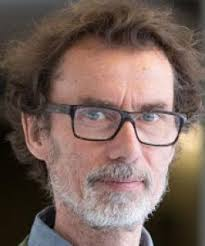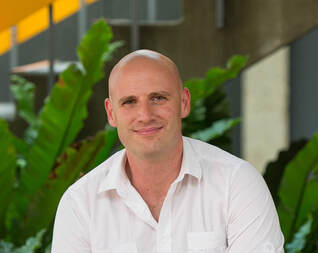|
by Nikola Stikov As we are getting ready to announce the 2020 OHBM Replication Award winner, here is a brief flashback to 2019 and our interview with Richard Dinga from the Department of Psychiatry at the Amsterdam University Medical Centers in the Netherlands. Richard led the effort to replicate a study published in Nature Medicine in 2017 about the relationship between resting state connectivity and the neurophysiological subtypes of depression.
0 Comments
 Biyu He Biyu He In the lead up to the OHBM Annual Meeting, I had the pleasure of speaking to one of the keynote speakers, Dr. Biyu He, an Assistant Professor at New York University. Dr. He has made many valuable contributions to the field of neuroscience, combining diverse imaging methods and analytical techniques to tackle big questions relating to perceptual processing, spontaneous activity and consciousness in the human brain. Rachael Stickland (RS): Thanks again for joining me. It's nice to - virtually - meet you. Biyu He (BH): Pleasure to meet you as well. OHBM 2020 Diversity Round Table: Intersection between Neuroscience and the LGBTQ+ community6/18/2020 Lee Jollans and the OHBM Diversity and Inclusivity Committee.
Edited by AmanPreet Badhwar At the 2020 virtual meeting, OHBM will, for the second time, host a Diversity Round Table. This year the round table will feature discussions on the intersection between Neuroscience and the Lesbian, Gay, Bisexual, Transgender, and Queer (LGBTQ+) community. The four speakers will outline the specific challenges LGBTQ+ individuals face working in STEM (Jon Freeman), insights into the possible developmental bases of sexuality and gender (Doug VanderLaan), the current body of research into transgender identity (and its limitations), and the challenges and considerations that are crucial for carrying out good sex and gender research (Grace Huckins and Jonathan Vanhoecke).  Tomas Paus Tomas Paus In preparation for OHBM 2020, we talked to Dr Tomas Paus, who will be giving a keynote lecture on Friday, June 26th. Dr. Paus is Director of the Population Neuroscience & Developmental Neuroimaging Program at the Holland Bloorview Kids Rehabilitation Hospital, and Professor of Psychology and Psychiatry at the University of Toronto. Roselyne Chauvin (RC): Thank you for taking the time to chat with us. In your talk you will be speaking about “population neuroscience and the growing brain.” There are a few ongoing longitudinal big data initiatives, such as ABCD or generation R. Those projects are now starting to think about the current pandemic situation. On one side, the situation is affecting everyone without discrimination; on the other, government responses create different experiences (from full to partial lockdown, to no restrictions), and of course, individuals show different stress responses. How do you think this might affect longitudinal datasets? And what are the questions that will need to be investigated out of this situation with regard to psychiatry and genetics? By Nils Muhlert  Michael Fox Michael Fox Professor Michael Fox is a neurologist at Harvard Medical School and director of the Lab for Brain Network Imaging and Modulation. His research into brain network imaging to define targets for brain stimulation holds considerable promise for new and improved treatments for a wide range of neurological and neuropsychiatric conditions. Here we found out how his academic career started through a chance meeting with Mark Raichle, about his plans for clinical translation of network neuroimaging, and his advice for early career researchers: By the OHBM Diversity and Inclusivity Committee (and endorsed by OHBM Council)
We share the deep sadness, outrage, and frustration that many around the world have felt in reaction to the murders of George Floyd, Breonna Taylor, and Ahmaud Arbery, and too many other innocent Black people over the years. As an international organization that strives to represent a diverse and vibrant global community of researchers studying the human brain, OHBM itself has struggled over its 25 years to incorporate initiatives and policies that reflect our values of inclusivity, tolerance, and respect. The events of these past weeks are a grim reminder that words alone are not enough to combat the systemic racism that plagues societies across the world, and we recognize that we have not done enough to support Black, Indigenous, and People of Color. By the OHBM Communication Committee
By now you've heard that the OHBM Annual Meeting will be virtual! The 26th Annual Meeting of the Organization for Human Brain Mapping is happening from June 23 - July 3, Saturday and Sunday excluded, and will take place entirely online. This is new for many of us so we’ve put together a short Q&A. Here we address a number of questions you may have, and provide a taste of what you can expect from this unique OHBM Annual Meeting experience.  Alex Fornito Alex Fornito Of course we all know that the brain functions as a network, but it is not straightforward to model it as such. One person who works very hard for us to be able to do so is Alex Fornito. He is a professor at Monash University and one of the leading forces in MRI-based network neuroscience. As he is also one of this year’s virtual meeting’s keynote speakers, I had the pleasure to invite Alex to a virtual meeting to ask about his scientific life. Ilona Lipp (IL): Thanks for joining me during these crazy times. Apart from OHBM going virtual, what else has changed in your scientific life in the last few weeks? |
BLOG HOME
Archives
January 2024
|
 RSS Feed
RSS Feed